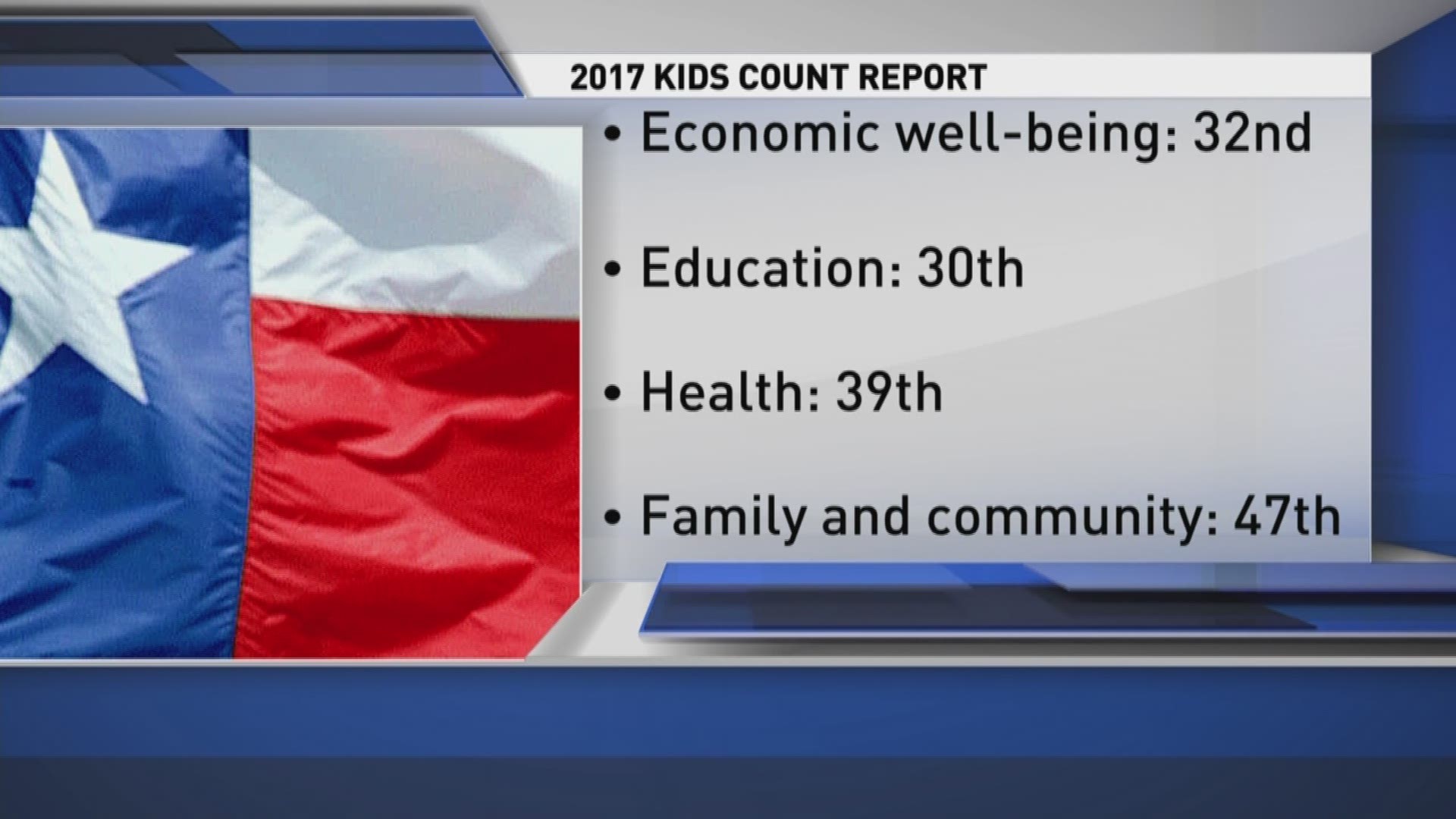The 7.2 million children living in Texas are the next generation of leaders, workers and voters. Their welfare impacts everyone in the state. So how does their well-being stack up to kids in the rest of the country?
According to the Annie E. Casey Foundation, not so great. The foundation's 27th annual "Kids Count Report" was released Tuesday and ranks Texas 41 out of 50 for overall child well-being.
"Disappointing but not terribly surprising," said Kristie Tingle, a Research Analyst at the Center for Public Policy Priorities. "We've been ranked in the bottom 10 states over the past few years pretty consistently."
The report uses data collected by the federal statistical agency to ensure the date is comparable. There is a two-year lag in the reporting data, so this year's report is based off on information collected in 2015. Researchers compare 16 key indicators, broken into four categories, for all 50 states.
Economic Well-Being
The first category used in the report is economic well-being, which evaluates the state's progress in four areas:
- Children in poverty (TX-23% US-21%)
- Children whose parents lack secure employment (TX-28% US-29%)
- Children living in households with a high housing cost burden (TX-32% US-33% )
- Teens not in school and not working (TX-8% US-7%)
Texas ranks 32nd in this category. While the state's economy is thriving, 23-percent of Texas children live in poverty which is slightly more than the national average of 21-percent.
Education
The second category is education where Texas got a ranking of 30. The four indicators that weigh into the education ranking are:
- Young children not in school (TX-58% US-53%)
- Fourth graders not proficient in reading (TX-69% US-65%)
- Eighth graders not proficient in math (TX-68% US-68%)
- High school students not graduating on time (TX-11% US-17%)
"Texas high school students actually are graduating on time at a higher rate than US high school students overall," said Tingle, "so we're beating the country average there."
But that achievement is overshadowed in the rankings by the percent of Texas children who aren't performing at their grade level in key areas.
"So when we're talking about if these kids are actually ready for the workforce and for college, um, maybe not," Tingle added.
Health
The third category used in the report is health. Texas is ranked 39th in the country for children's health based on the following four indicators:
- Low-birth-weight babies (TX-8.2% US-8.1%)
- Children without health insurance (TX-9% US-5%)
- Child and teen deaths per 100,000 (TX-25 US-25)
- Teens who abuse alcohol or drugs (TX-5% US-5%)
In each of the four indicators, Texas improved it's ranking compared to data from 2010.
"When we talk about health insurance, we have seen some gains over the past five or six years, largely due to the expansion of the Affordable Care Act," said Tingle.
But Texas is ranked 48th in the country for having the most uninsured children.
"That's a lot of kids that don't have health care in Texas," said Tingle. "When children don't have health insurance, they don't go to doctors, they don't get the preventative care they need, they don't get the treatment for different things that come up they need; it puts their family at financial risk if some kind of disaster happens with their child's health."
And Texas lawmakers didn't help address the issue in the 85th Legislative Session.
"With Texas choosing not to fund Medicaid, expand Medicaid, not to close the coverage gap, we're seeing that children and adults aren't getting increased access to healthcare," Tingle said.
Family and Community
The final category in the study is Family and Community. The Lone Star State comes in at 47th based on four indicators:
- Children in single-parent families (TX-36% US-35%)
- Children in families where the household head lacks a high school diploma (TX-21% US-14%)
- Children living in high-poverty areas (TX-18% US-145)
- Teen births per 1,000 (TX-35 US-22)"
The one [indicator] that maybe drives that ranking the most is the percentage of children who are living in areas of concentrated poverty," said Tingle. "So 18 percent of Texas children live in a high poverty neighborhood. And when these kids live in high poverty neighborhoods, they don't have access to everything they really need to thrive."
Tingle said that includes access to libraries, public transportation or grocery stores.
"I don't want to make it sound like all of this is bad news because we definitely are more middle of the road in some places and Texas is ranked in the top states in a few indicators," Tingle added. "I think that we're just not making the investments in kids. We're not making the investments in their education, in their health."
Many hoped the 85th Legislative Session would be the year of the child and lawmakers would focus on children. There were some gains, for instance, more money for Child Protective Services. But compared to the rest of the nation, Tingle says Texas is lagging.
"Texas is still one of the bottom states for CPS funding. So we're not doing what other states are doing," she said.
Another area Tingle said lawmakers fell short was Pre-K.
"Pre-K was expanded, but the school districts are just expected to pay for it. It's not funded."
The intent of the report is simple; give people information so they can hold policy makers responsible. It's something Tingle said the Center for Public Policy Priorities intends to do.
"What we'd like to see in the future is working toward actually strong education support in terms of finance, strong support for kids in terms of health care and overall just focusing on children instead of making the conversation about more discriminatory issues," said Tingle.
Because taking care of Texas kids, is taking care of Texas' future.

